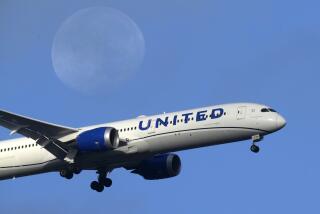Continental, United form alliance
DALLAS — Continental Airlines Inc. and UAL Corp.’s United Airlines, which failed to complete talks this spring to become a single carrier, said Thursday that they would work together in an alliance they hope will boost revenue to offset rising fuel costs.
In striking a deal with United, Continental ended alliance negotiations with AMR Corp.’s American Airlines, the nation’s biggest carrier, and British Airways.
Under alliances, airlines typically sell tickets on each other’s flights, which can result in increased revenue. Alliances are easier to put together than mergers, which can run into opposition from labor unions or regulators.
But alliances have their limits. Without antitrust immunity from regulators, airlines are barred from working together on prices and schedules. And airlines that merge can shed overlapping routes, planes and workers.
Continental said it would seek antitrust immunity from the Transportation Department to form joint ventures on trans-Atlantic flying with United and Lufthansa, and eventually on flights to Latin America and Asia.
But in the U.S., the Continental-United deal will be limited to code-sharing -- selling tickets on each other’s flights and offering reciprocal frequent-flier and airport lounge programs.
Continental and United said they hoped to reduce costs by working together. As fuel costs have surged, airlines have reduced capacity and have raised fares and fees.
Continental and United said they would link their networks and would join the Star Alliance, one of three competing teams of airlines around the world.
Continental will leave the SkyTeam alliance, which includes Delta Air Lines Inc. and the carrier Delta plans to buy, Northwest Airlines Corp.
American and British Airways tried to lure Continental to their team, called Oneworld. But the move grew less likely as Continental resumed its flirtation with United.
“We are still talking to BA [British Airways],” said Tim Wagner, a spokesman for American.
Earlier this year, Continental and United were in advanced talks to become a single carrier. But Continental walked away from the deal after UAL reported a huge first-quarter loss.
More to Read
Inside the business of entertainment
The Wide Shot brings you news, analysis and insights on everything from streaming wars to production — and what it all means for the future.
You may occasionally receive promotional content from the Los Angeles Times.










